Everyone who has ever run a business, small or large, knows the role tools and technology play in its growth. Small business tools help you streamline operations, manage tasks, communicate seamlessly, and boost the productivity and efficiency of your team.
These are not just a luxury but a necessity to thrive in today’s competitive market. That’s why small and medium-sized businesses spent USD 1.45 trillion on technology in 2023, and the investments in tech will only rise.
In this guide, we’ll explore the types of business tools you need to save man-hours, money, and unnecessary stress while satisfying your clients or customers.
We’ll also explore the top options in every business tool category, including their best features and use cases. Let’s check out the most essential tools for small businesses.
Project and Task Management Software Solutions
Unless you’re a Luddite keen to manage projects and tasks armed only with a notepad and pen, you probably already use some project management tools to streamline your project’s progress 一 and that’s a good thing.
These tools help you plan and monitor projects, allocate resources, assign tasks, and manage budgets in real time. Managing everything in one place enables you to complete tasks within the promised timeline and hold team members accountable for their responsibilities.
In the last 25+ years of running multiple businesses, I’ve tried and tested various project management tools. Here are some of my favorite ones that can help you streamline your business operations:
1. ClickUp
ClickUp is a powerful project management tool that helps you create and manage multiple projects, tasks, task statuses, Docs, forms, and whiteboards. It is the perfect business tool for planning your project timelines, assigning responsibilities, breaking it down into tasks and subtasks, and tracking progress.
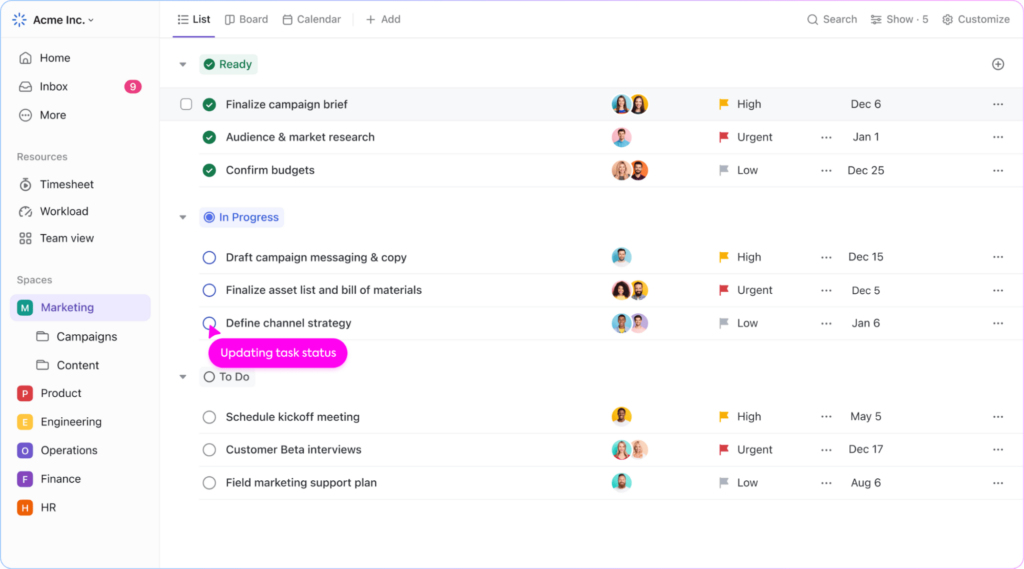
Your team members can also track time spent on each task and subtask, and delegate the succeeding action to another team member. This way, it’s easier to hold people accountable and ensure progress.

ClickUp lets you see collective and individual time spent on each task and project, across the day, week, or month.
You can also automate workflows to auto-delegate tasks to the next person in the queue. It brings teams together to work collaboratively, increasing team efficiency and speeding up project deliveries.
Also, read my full review of ClickUp to explore its essential project and task management features and use cases.
ClickUp offers a free forever plan with unlimited tasks and unlimited team members. For advanced automation workflows, unlimited storage, Gantt charts, and more, sign up for its Unlimited plan with a price starting at $7 per user per month.
2. Google Workspace
There’s no such thing as being too organized. It’s amazing how much work you can accomplish when things are in order. Powerhouse Google understood this and created Google Workspace (formerly G Suite) to help businesses create, connect, and collaborate.
Google Workspace includes essential business tools such as:
- Gmail – Business email
- Calendar – Book appointments and meetings
- Drive – Secure cloud storage
- Docs, Sheets, and Slides – Collaborative content creation
- Meet – Video and voice conferencing
- Gemini – AI-powered assistant

You can get even more from the Google apps you already use and love, and streamline your business processes.
For starters, Google Workspace business tools give you access to custom professional email addresses @yourcompany. It helps you build trust and gives your business a professional outlook.
Whether your team works in spreadsheets, email, Docs, video calls, or all of the above, these business tools cover all the bases. You’ll love the real-time collaboration, suggestions, and editing features.
You get expanded Drive file storage for your project files and have the flexibility to access them anytime, anywhere.
The Google Calendar feature helps you coordinate activities by setting up appointments and reminders about scheduled events. Everyone stays on the same page about ongoing projects and new developments.
Best of all, you get 24/7 customer support to get through any hiccups you may experience while using the Workspace.
Their Business Starter pricing plan starts from $6 per user per month (1 year commitment). You may also try to use the G Suite apps for free to test drive them before you commit to the Workspace plans.
3. Trello
One of the best free business tools out there is Trello. It allows you to collaborate with your team members around the globe and helps you organize your tasks as well.
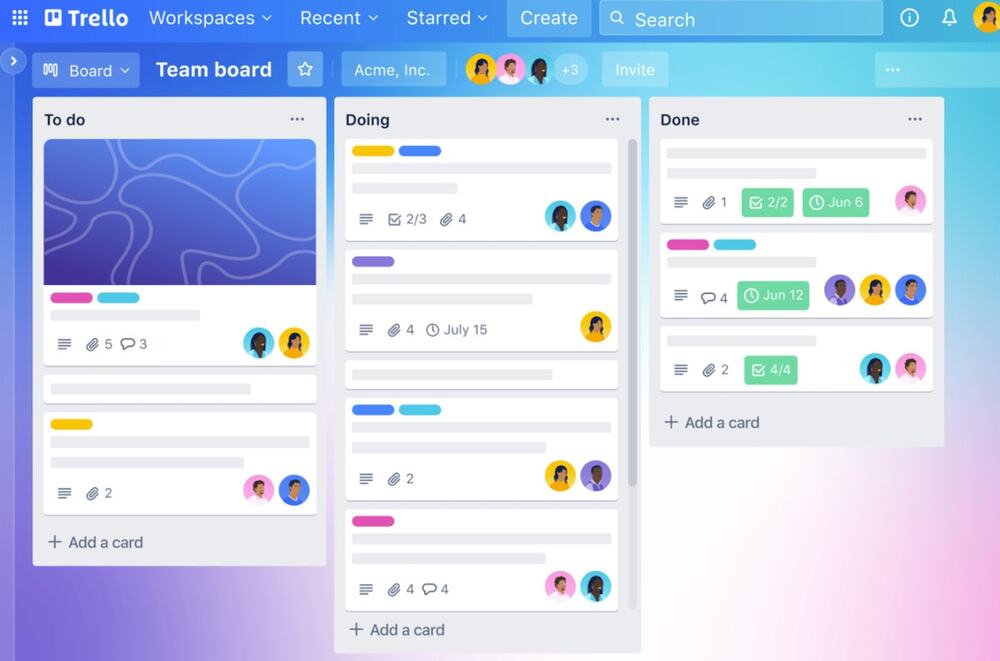
You can create Trello boards and lists to manage your project and workflows anywhere. Use Trello cards to create individual tasks and ideas and move them through your “To Do,” “Doing,” and “Done” lists. You can assign them to specific team members and track progress.
Trello also offers a Calendar view to help you see who’s working on what task and when you can expect each delivery.

This project management tool integrates seamlessly with other powerful business tools like Slack, Zapier, and Hubstaff.
You can start using Trello for free. To scale collaboration via advanced features, you need to sign up for one of their paid plans, starting at $6 per user per month (billed monthly).
4. Dropbox
Dropbox is another cloud-based file-sharing and management platform that lets you store, access, edit, and transfer your business files. While I prefer Google Workspace, Dropbox is also an excellent option to store large volumes of digital assets.

It offers a basic free account with 2GB cloud storage 一 you can accomplish so much with this.
- Edit and sign your documents.
- Collaborate on multiple projects.
- Securely store your content on the cloud and access it from anywhere at any time.
Paid plans start from $9.99/month for up to 2TB of cloud storage.
5. Toggl Track
Toggl Track is a free time tracking software that helps you see exactly how much time your team spends on each task and project. Keeping track of time helps you improve estimates, bill your hours accurately, organize tasks, and boost your team’s productivity without micro-management.

The time-tracking insights from Toggl also help you evaluate the profitability of your projects. You can streamline tasks and cut down on activities that aren’t profitable to the business.
Communication Tools
Communication is at the heart of a business. Whether you’re conversing with employees, customers, or other external parties (suppliers, contractors), you should be able to get your message across, absolutely hassle-free.
By communication, I mean instant messages, calls, video meets, and emails 一 whichever channel fulfills the purpose. Here are some of my favorite communication tools for small business owners:
6. Slack
Effective communication is essential in the workplace. Employees can only give their best if they fully understand what to do for each assigned task. When information isn’t communicated correctly at the right time, there are bound to be avoidable errors and delays.
Slack is an easy-to-use messaging platform that lets you communicate effectively with your team members and share files and ideas with internal and external parties.
You can communicate with team members as a group or with any of them individually. Its specialized features allow you to save conversations separately and access them much later, bypassing the hassle of going through tons of messages.

Apart from instant messages, you can also host Huddles (audio and video meetings) to discuss plans and processes. Slack Clips lets you record and share updates without being online simultaneously.
Slack integrates seamlessly with other time trackers, file-sharing apps, project management tools, and other business tools to help streamline your operations.
You can try Slack for free. It offers a web version and desktop and mobile apps that let you communicate on the go. I love its intuitive interface across devices.
Paid plans start from $7.25 per user per month. With the paid plan, you get features such as unlimited message history and unlimited integrations.
7. Livestorm
Livestorm is a webinar and video conferring software that helps small business owners host webinars and online meetings. It makes it easier to build an audience, boost engagement, and gather more leads for your business.
Some of its key features include:
- Interactive webinar options such as chat, questions, polls, and replays
- Automated emails and registration pages
- No software installation is required, boosting the attendance rate

From 1:1 meetings to company-wide seminars and on-registration webinars, you can effortlessly host all your interactive video conferences with Livestorm.
Its paid plans start from $99/month, and this Pro plan lets you host webinars with up to 100 live attendees. You can upgrade to a higher-tier plan for events with more attendees.
8. Microsoft Teams
Though I prefer Google Meet and Slack, Microsoft Teams is a professional online business meeting solution trusted by hundreds of teams.You can use Microsoft Teams for instant messaging, video calling, file sharing, and collaborative project planning. It is a popularly adopted communication platform by many of the top companies in the world.

You can try Teams for free or sign up for a paid plan, starting at $6/user/month. With the paid plan, you’ll also get a custom business email (you@yourcompany) and 1TB of cloud storage per employee.
CRM and Lead Generation Tools
Another type of tool every business needs is a customer relationship management system, widely known as CRM software.
These tools help you build better customer relationships through effective and timely engagement, boosting conversion and customer retention rates. That’s why the global CRM market value is expected to reach $57 billion in 2025.
You can use CRM tools to keep track of prospects, store contacts, follow up on your messages, and move leads down the sales funnel. With the right business tool, you’ll never miss out on a customer again.
Here are a few CRM and lead generation tools for small businesses:
9. HubSpot
HubSpot is an all-in-one customer relationship platform that helps with website management, marketing, sales, operations, and customer service. You can use it to manage your projects from end to end.
Its content management software (CMS) helps you create and manage content and build your website to suit your audience’s needs in one place.

Its intuitive interface is easy to use and adapt. It provides a unified view of your customer’s journey and interactions with your company, helping you deliver seamless customer experiences.
And the best part? It helps perfectly align your marketing, sales, operations, and customer service teams, empowering your brand’s growth.

Your marketing department works hard to generate leads and follow up with them. As the lead count increases, things could get messy and lead to losing prospects who would otherwise become loyal customers.
That’s where the proper organization of customer and lead data becomes essential. It helps you tick the boxes on your to-do list.
HubSpot offers automation that sorts and organizes your sales activities, creating a clean spreadsheet for you to execute things with professionalism. You can keep track of leads, schedule engagements and monitor progress, ridding you of tedious manual actions. Because manually doing all these things can be daunting, don’t you agree?
10. UpLead
UpLead is a leading real-time verified B2B database that helps you get accurate business contact data to drive growth. You get access to the email addresses, mobile numbers, and intent data of your B2B prospects, making outreach and sales campaigns more effective.

This prospecting tool prioritized data accuracy to fuel your marketing and sales campaigns, resulting in more engaged conversions and faster deal closings.
Use this business tool to find customers actively looking for the product or service you sell and are ready to buy.
11. Leadpages
Leadpages is another one of my favorite business tools for lead generation and stress-free conversions. It helps you build high-converting landing pages with industry-leading conversion tools and the best-performing landing page templates.

With Leadpages, you can:
- Create high-converting landing pages and lead magnets to grow your email list and capture leads across marketing channels.
- Track traffic, conversions, and leads for every page.
- Generate copy and images with AI.
- Promote the right offer in the right place at the right time using pop-ups and alert bars.
- Conduct A/B tests to boost conversion rates.
- Search, sort, filter, and export leads to your favorite email marketing tool.
Generating high-quality leads can help boost your business revenue in no time. Optimize your pages, social ads, pop-ups, and more with expert-acknowledged templates and data insights.
Marketing Automation Tools
Marketing is a vital process for all business types. It helps you build awareness about your brand, attract customers, and position your products in the market.
Leveraging the best marketing automation tools can help you save time handling repetitive tasks, enabling you to focus on optimizing your strategy for success. These business tools let you gather and analyze data and double down on strategies that generate the best results.
Let’s explore a few marketing automation tools you can use for email marketing, social media marketing, SEO, and content marketing.
12. Mailchimp
Mailchimp is a widely recognized email marketing and automation software with generative AI, list segmentation, and analytics features. It offers pre-built email templates, a drag-and-drop editor, one-click automation, and A/B testing features.

You can track your email campaign’s open rate and the total number of email opens and link clicks. It lets you check for unsubscriptions and spam flags. These insights help improve your email campaign messages to retain and engage more subscribers, and convert them into buying customers.
You can start using it for free for up to 500 subscribers and 1,000 email sends/month. Check out other Mailchimp alternatives for automating your business email campaigns too.
13. Semrush
Semrush is my all-time go-to tool for search engine optimization, including site audit, keyword research, rank tracking, local SEO, and link building. Its intuitive interface makes it an easy-to-use analytics and reporting tool for website traffic, rankings, links, and content positioning.


Along with detailed keyword research, you can conduct topic research and check your content’s SEO and readability scores through Semrush.

Its social toolkit lets you create and schedule social media posts, too.
So, it’s like having one dashboard for your 360° marketing needs. To me, it’s a must-have business tool for small businesses looking to start building their company on the right foot.
Read my full review of Semrush to explore its features and use cases in detail and understand how this tool helps your business grow.
14. Brevo
Brevo (formerly known as Sendinblue) is an all-in-one marketing platform for email, WhatsApp, and SMS campaigns. It allows you to grow your list to an unlimited number of subscribers at no extra cost with easy-to-embed signup forms.
You can easily customize your emails with a drag-and-drop editor. Brevo also lets you save blocks you want to reuse in your email campaigns.
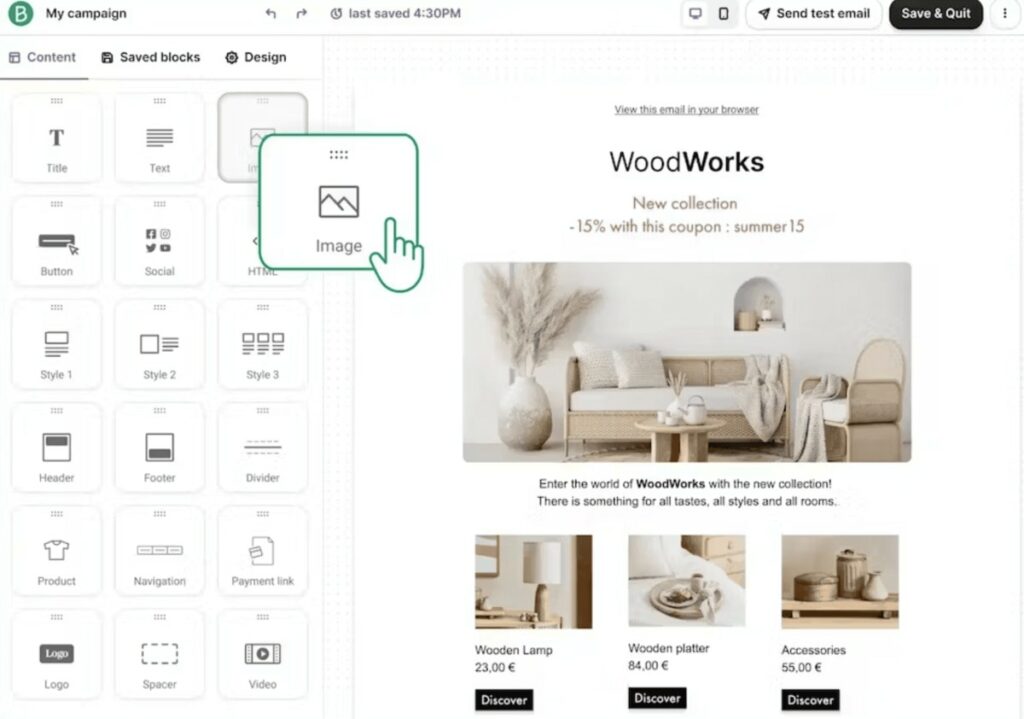
Try it for free with unlimited contacts and up to 300 emails/day. Its paid plans start from $9/month with 5,000 emails/month and no daily email sending limit.
Human Resources Software Tools
Recruiting staff can be a costly process, particularly for small business owners. Think about the time and money you need to spend on background checks, skill tests, reference verification, and, not to mention, degree verifications.
Hiring a recruitment consultancy takes much of the legwork away, but it’s expensive in its own right, and the turnover cost can be high. Thankfully, we’ve got powerful HR business tools to help you streamline your recruitment processes.
15. GoodHire
Used by over 100K employers, GoodHire is known for its user-centric, mobile-optimized workflows and ease of use. It helps you hire better and faster with detailed background checks.
This hiring platform assures accuracy and makes it seamless to initiate, track, and manage the results of background checks effectively. It also conducts resume checks, drug screening, and international checks.
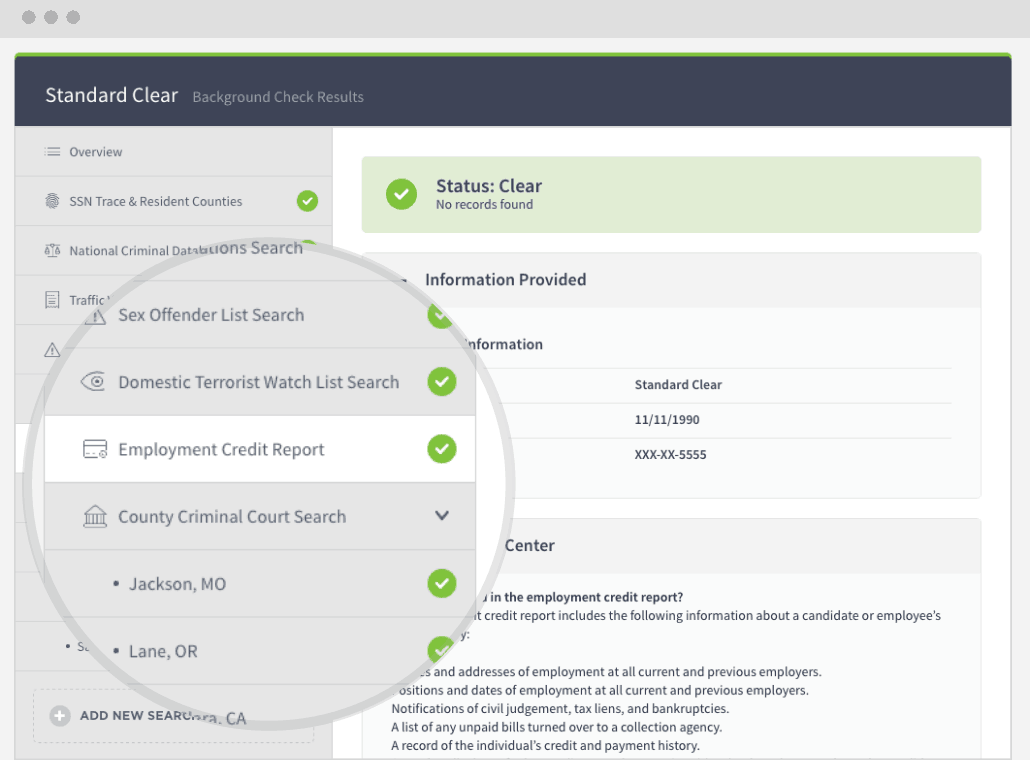
Their pricing plans start at $29.99/check for less than 10 checks per year. For more than 10 checks per year and 100+ screening options, request a custom quote.
16. Zoho Recruit
Zoho Recruit is yet another helpful hiring platform for businesses. It helps you find, track, and hire candidates from numerous sources directly from the dashboard.
Additionally, you can create and publish job alerts to premium job boards. Zoho Recruit lets you design pre-screening assessments to help you automate your hiring process and workflow.
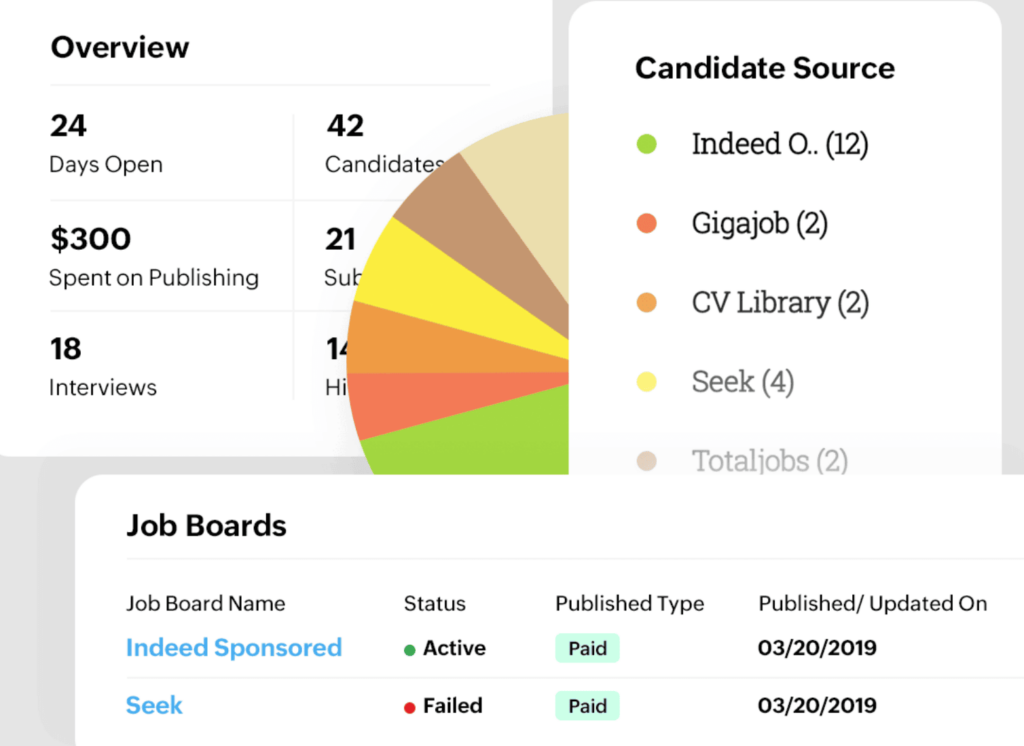
The best part about this business tool is that you can get detailed analytics and reports about your recruitment process, helping you identify ways to screen and hire more appropriate candidates, faster.
Business Accounting Software and Payroll Management Tools
Digital accounting solutions help you track expenditures, sort out taxes, run reports, handle payroll, invoice customers, and put checkmarks next to all key financial management processes.
While you can do bookkeeping and accounting using Google Sheets at the start, an accounting software solution becomes crucial as your business grows. It helps simplify your finance management processes and delivers insights into cash flow forecasting and budgeting.
Many of these finance tools offer integrations with other major CRM and customer service apps, giving you better functionality.
17. QuickBooks
QuickBooks is a feature-packed finance management suite for your business, including accounting, payroll, tax filing, and invoicing tools. Its plans start from $35/month. You can upgrade as your business grows, allowing seamless scalability and access to advanced financial planning tools.

With QuickBooks, you can:
- Automate business bookkeeping and accounting.
- Track business expenses all year round and never miss out on claiming tax deductions.
- Predict and manage your cash flow, earnings, expenditures, and profits.
- Track your team members’ working hours, release payments, and automate payroll taxes efficiently.
- Create and send invoices to your clients with real-time tracking of billable hours.
Start using QuickBooks to run your business confidently.
18. ZipBooks
Payments and billings are crucial in businesses – inaccuracies could lead to setbacks. To avoid losing out on your hard-earned money, use ZipBooks, a simple accounting and online invoicing tool for small businesses and freelancers.
This business accounting tool lets you:
- Send professional invoices to your clients and get paid seamlessly through auto-billing templates, recurring bills, and automated payment reminders.
- Keep account of all business expenses, split them into categories, and save receipts.
- Get insights into your most profitable clients and the best ways to retain them.
- Track your cash flow and business growth score.

ZipBooks helps speed up things while ensuring an error-free, smooth, end-to-end billing process. Start using it for free or upgrade to paid plans starting at $15/month to unlock more accounting tools.
Customer Service Tools
Happy and satisfied customers are the reason behind thriving businesses, resulting in regular revenue and profits. Unfortunately, many also shut down due to poor customer service.
It’s quite simple: If customers aren’t well attended to, they look for the next available competitor who’s willing to treat them right. You can’t afford to take customer service and satisfaction lightly if you want to build a sustainable business.
While improving customer service may look easy, it is a lot of work to compensate for a mishap, including instant messages, prompt resolutions, and incentives. In aspiring to succeed in this journey, the best customer service business tools can be your ally.
19. Tidio
Tidio helps you automate customer service by letting an AI chatbot answer 70% of customers’ questions without human intervention. These queries can be related to shipping, product availability, and order status.

Tidio’s conversational AI, Lyro helps businesses reduce their average response times by 29%, resulting in a higher customer satisfaction rate.
If the bot can’t handle a question, it will pass the user query to a human agent. You can also track how your customer service representatives respond to those complex queries and how efficiently they provide resolutions.
Tidio also has various automated plug-and-play flows to offer discounts, recommend products, and drive sales from abandoned carts. It’s easy to automate sales using its drag-and-drop contextual flows builder to engage customers during every step of their buying journeys.
You can try Tidio for free. Its paid plans start at $29/month and its Lyro AI conversations start at $0.5/conversation.
Also, read my full review of Tidio to explore its various use cases.
Additional Business Tools for Small Businesses
Here are some other powerful business tools you should try in 2025:
- WordPress for building websites
- Canva for designing graphics
- CapCut for social media video editing
- BigCommerce for ecommerce website building
- Cloudways for web hosting
- Transistor.fm for podcast hosting and analytics
- Calendly for scheduling meetings and appointments
- VYPER for hosting giveaways and contests
- Heepsy for influencer marketing campaigns
- Free Invoice Generator for invoicing
- Shopify for online selling
Which Tools Should You Use for Your Small Business?
Technology makes your work easier and helps you achieve your business goals. The business tools I’ve discussed above can help you automate mundane tasks, get data-driven insights, and save you time to focus on your core business activities.
Start using the best business tools and apps for social media management, project management, content marketing, online meetings and communication, file sharing, and designing.
Are you ready to accelerate your business growth? Finalize your business toolkit today. I recommend using the free tools and free versions and then carefully investing in tools that drive maximum value for your growth.
Explore my favorite business tools and get the best deals on them!


Related Articles
What is Affiliate Marketing & How Does It Work?
How to Become an Affiliate Marketer: A Comprehensive Guide
32 Affiliate Marketing Tools Every Smart Marketer Needs to Know in 2025
Top 9 Affiliate Marketing Strategies for 2025
Affiliate Marketing 101: How to Set Up a Profitable Partner Program
Complete Guide to SEO Affiliate Marketing to Help You Make More Money